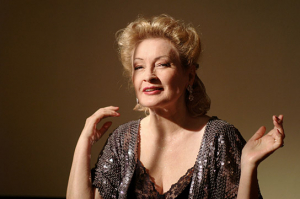Gallery
All Pictures (12)Biography
Ingrid Caven (née Ingrid Schmidt) was born on August 3, 1938 in Saarbrücken, Germany. Her younger sister was the opera singer Trudeliese Schmidt (1943-2004). After graduating from high school, she studied art history, psychology and pedagogy and worked as a teacher. In the mid-1960s, she became involved in the Munich film scene and played her first role in a short film. In 1968, she met Rainer Werner Fassbinder and finally embarked on an artistic career. She became a member of Fassbinder's antiteater and appeared in his films. For her role in Fassbinder's "Liebe ist kälter als der Tod" ("Love Is Colder Than Death", 1969), she received the German Film Award in 1970, along with the film's female ensemble (including Hanna Schygulla and Irm Hermann).
Over the next few years, Caven became Fassbinder's muse, and they were married from 1970 to 1972. She appeared in 18 of his films between 1969 and 1978. However, Fassbinder mostly cast her in small supporting roles, often as a singer. Caven later revealed, "He mainly wanted to work with me so that I would be there, not to push me into the limelight. It was a declaration of love and it was because of our intense relationship. I wasn't really there as an actress." Fassbinder occasionally gave her leading roles, such as in "Mutter Küsters' Fahrt zum Himmel" ("Mutter Küsters Goes to Heaven", 1975), where she played the selfish daughter of the title character.
Besides Fassbinder, Caven also worked with other important directors of the young German cinema. Hans-Jürgen Syberberg cast her as Lola Montes in "Ludwig - Requiem für einen jungfräulichen König" ("Ludwig - Requiem for a Virgin King", 1972). She worked with Werner Schroeter in "Der Tod der Maria Malibran" ("The Death of Maria Malibran", 1972), "Goldflocken" (1976) and "Tag der idioten" ("Day of the Idiots", 1981).
Caven also worked closely with Daniel Schmid, who considered her an artistic muse, appearing in five of his films. Her portrayal of a nightclub singer in the title role of "La Paloma" (1974) brought her international fame. Another important role was as a prostitute and daughter of a Nazi in Schmid's "Schatten der Engel" ("Shadow of Angels", DE/CH 1976), an adaptation of Fassbinder's controversial play "Der Müll, die Stadt und der Tod" ("Garbage, The City and Death"). Two years later, she had the lead role of a prostitute named Red Zora in Fassbinder's "In einem Jahr mit 13 Monden" ("In a Year with 13 Moons", 1978), which also incorporated motifs from "Garbage, The City and Death" and marked the last film collaboration between Caven and Fassbinder.
In the mid-1970s, Peter Zadek fulfilled her "dream" by organizing a cabaret evening for Caven in Paris. The performance was a great success and led to a second career as a chanson singer. She toured Germany and Italy, but it was in France that she became known as a celebrated diva, performing Edith Piaf chansons as well as Kurt Weill and Arnold Schönberg interpretations.
Despite her success as a singer, Caven remained dedicated to acting. Her portrayal of a chanson interpreter in "Looping" (1980) won her the German Film Award. Jeanine Meerapfel cast her in the title role of her autobiographically influenced feature film "Malou" (1981). In the late 1980s, Caven appeared in small roles in Zadek's "Die wilden Fünfziger" ("The Roaring Fifties", 1983) and Vadim Glowna's "Des Teufels Paradies" ("Devil's Paradise", 1986).
From the 1990s, Caven appeared only sporadically as an actress, often in (co-)productions with France. She played small supporting roles in André Téchiné's "Ma saison préférée" ("My Favorite Season", FR 1993), Dani Levy's "Stille Nacht" ("Silent Night", DE/CH 1996) and Raoul Ruiz's "Le temps retrouvé, d'après l'oeuvre de Marcel Proust" ("Marcel Proust's Time Regained", FR/IT/PT 1999).
Her life partner, Jean-Jacques Schuhl, wrote the biographical novel "Ingrid Caven," which won the prestigious French literary prize, the Prix Goncourt, in 2000. In 2001, Caven was awarded the Chevalier des Arts et des Lettres in France.
In the 2000s, she appeared in the black comedy "Deepfrozen" (AT/CH/LU 2006), portrayed the eccentric mother of the protagonist in "Weitertanzen" (2008), and played the aunt from Germany in Claire Denis' Parisian father-daughter story "35 rhums" ("35 Shots of Rum" FR/DE 2008). She also had notable roles as a fairy in the modern fairy tale "Belle Dormant" ("Sleeping Beauty", FR/ES 2016) and as a ballet teacher in Luca Guadagnino's acclaimed remake of the horror classic "Suspiria" (US/IT 2018).
In 2018, Caven appeared alongside Helmut Berger in the play "Liberté" at the Volksbühne Berlin, portraying an aging baroque duchess. She also had a small but notable role in the Portuguese film adaptation of Musil's "The Portuguese Woman" (2018), reciting poetry (including that of Walter von der Vogelweide).
